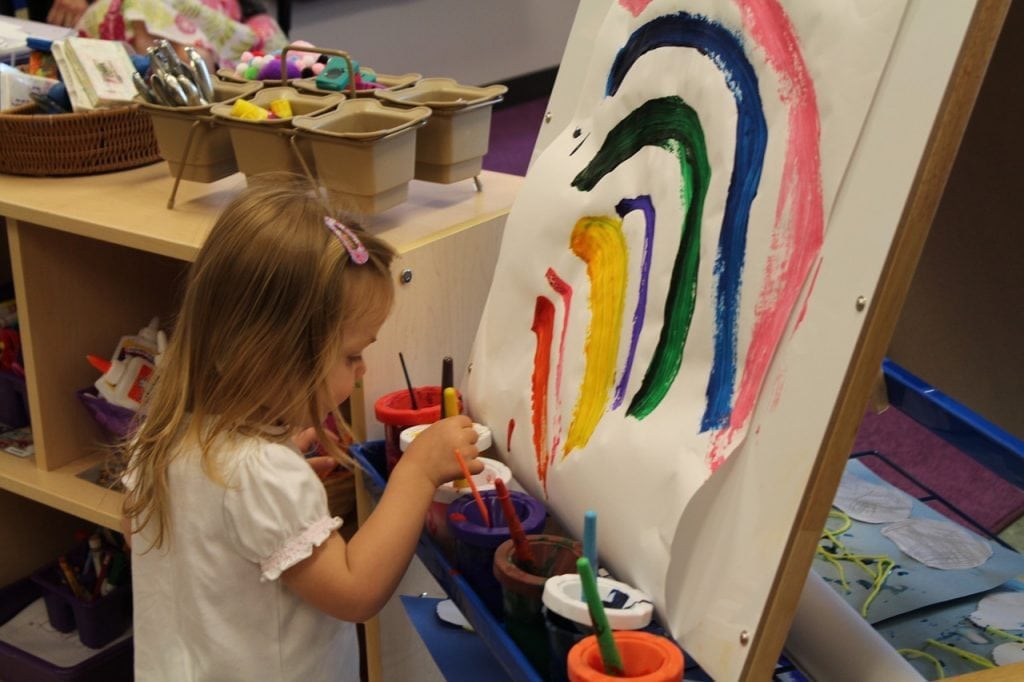We hear it all the time, and yet we can’t hear it often enough: Children’s early years matter. Your child’s first interactions with you and with others, the environment you create for your family, and your child’s earliest educational experiences influence how your child’s brain is built, and set the tone for her or his relationships with others and future learning.
The idea can feel overwhelming, but by asking yourself a few simple questions about your child, your parenting style and your educational plans, you can start to find direction.
I spoke with three experts in the fields of early brain development, mindful parenting and early-childhood education for pointers on where to focus during those early years.
- Roma Khetarpal is the author of the award-winning book “The Perfect Parent,” and a parent coach and speaker on the topic of mindful parenting. She will discuss how important it is for parents to act as an anchor of safety and comfort for their children, and how providing a secure base for exploration allows children to take the lead in learning.
- Dawn A. Kurtz, Ph.D., has worked in the child development and early-childhood education fields for more than 15 years. As the Chief Program Officer for Los Angeles Universal Preschool (LAUP), she will discuss how to find the best preschool for your child.
- Pat Levitt, Ph.D., is Simms/Mann Chair in Developmental Neurogenetics at Children’s Hospital Los Angeles and the University of Southern California. His research focuses on brain development and social-emotional behavior, and the importance of early parent-child communication such as reading, singing and playing.
Learning Foundations
Often, parents want to know things like “How much time should I spend interacting with my kids?” says Pat Levitt, Ph.D., Simms/Mann Chair in Developmental Neurogenetics at Children’s Hospital Los Angeles and USC.
But Levitt, whose research focuses on brain development, social-emotional behavior and the importance of early parent-child communication and interaction, explains that there isn’t one right answer. “It’s not an exact science,” he says.
Because all children are different, parents should guide their interactions by asking themselves:
- How does my child respond to changes? Is she shy? Nervous? Outgoing? A risk taker?
Each child has her or his own tendencies and temperament. “If every infant responded the same way, it would be a pretty boring world,” Levitt says. Based on your answers to these first questions, you can consider:
- What environment is best suited to my child?
Some kids like lots of activity and lots of people. Others are upset by that, and focus better in a calm, quiet space. One constant, though, is that close interaction is essential for every child’s brain development. When you are talking, reading or playing with your child, ask yourself:
- Is my child getting my full attention?
If you are reading, watching television, surfing the Internet or looking at your phone, your child doesn’t have a good view of your face – or your focus. “Infants become face experts right away, because that’s how we learn to read emotions,” says Levitt. They focus on the eyes and the mouth, and also learn the foundation of vocalization that way.
Back-and-forth interaction with your child, known as “serve and return,” provides the basis for the earliest brain development. “Those interactions turn out to be the substrate upon which cognitive development occurs,” Levitt says.
“Play and other forms of creative interaction are also important,” continues Levitt. So ask yourself:
- Am I giving my child opportunities to explore music and rhythm, art and movement?
- Am I giving them time for undirected play?
“The brain is built by first putting together simple circuits and then putting together the more complicated circuits,” Levitt says. Your child might not become a musician, artist or dancer, or play sports professionally, but these activities lay a foundation for future development.
Building the Relationship 
Asking questions about our children and our parenting is important for many reasons. “Through questions comes perspective,” says Roma Khetarpal, author of “The Perfect Parent” and a parenting coach focused on “mindful parenting.” One of the most important we can ask ourselves is:
- What is my goal for myself as a parent?
It wasn’t until her two children went off to college that Khetarpal realized that the true goal for parents is building a relationship with our kids. “If we don’t have a relationship with them, then we are going to feel like a failure,” she says. “You want to keep in mind that the connection is your goal.”
Connection comes through communication, so another important question for parents to ask is:
- Am I communicating with and really listening to my kids?
There is a difference between merely hearing and really listening; letting children complete their sentences and their stories is an important part of communication, because communication is not a one-way thing. “Communication is about communing, about coming together,” says Khetarpal. Listening without interruption can turn communication breakdowns to breakthroughs. Communication is also driven by emotions, and learning to manage emotions is essential for maintaining your relationship with your children.
Another important path to effective communication is using times when children make mistakes. Ask yourself:
- How do I handle my children’s mistakes? When I’m right, am I kind?
- How do I handle my own mistakes as a parent?
Most disagreements come from not being able to manage our emotions. But asking your kids to squash their emotions will only create problems. “That emotion is a frequency,” Khetarpal says. “It’s going to find a home somewhere.” Ask yourself:
- Am I giving my kids a safe place to express their emotions and figure out what is behind them?
“There’s no safer place for children to go than to their parents,” says Khetarpal. “It’s a parent’s job to give children a safe place to identify, express, discuss and release emotions that are burdening them.”
As you and your kids learn to become emotionally intelligent by identifying emotions and building an emotional vocabulary together, you can start to manage those emotions. And that will help create an environment where your relationship can thrive. “Character,” says Khetarpal, “is built by the environment that we create for our kids.”
Moving On to Preschool
 That environment is also an important way you can instill a lifelong love of learning in your child, and help to ensure that your child will be comfortable once it is time for school, according to Dawn A. Kurtz, Ph.D., chief program officer for Los Angeles Universal Preschool. Kurtz has worked in early-childhood education for more than 15 years and believes parents should be asking themselves:
That environment is also an important way you can instill a lifelong love of learning in your child, and help to ensure that your child will be comfortable once it is time for school, according to Dawn A. Kurtz, Ph.D., chief program officer for Los Angeles Universal Preschool. Kurtz has worked in early-childhood education for more than 15 years and believes parents should be asking themselves:
- Am I asking my child open-ended questions that offer a chance to think, wonder and build vocabulary?
- What opportunities does my child have to develop her or his social skills?
- What opportunities does my child have to interact with adults?
Questions that encourage kids to wonder “what if” or “what will happen next” or to examine what they think and feel, and chances to interact with other children and adults, are important for all children and are key elements of a quality preschool program.
With so many options available, parents should choose a program with care. “Some families feel really strongly about the type of experience they want their child to have,” says Kurtz. One important choice is between home-based or center-based programs. To help you decide, Kurtz suggests asking:
- What is my child’s personality and temperament? Does it match with the program environment?
- What organized activities has my child had the chance to participate in?
“A child who hasn’t had a lot of organized activities or social experience outside of the immediate family might be better of starting in a smaller environment,” Kurtz says. She adds, though, that among the preschools her organization works with, there will be quality learning opportunities at both home-based and center-based programs. “You’re not going to get a lesser experience in one versus the other.” Programs will, however, follow different educational philosophies, so it is important to consider:
- Are you familiar with the different preschool educational philosophies?
- What do you know about kindergarten readiness?
Even if you already have decided which educational philosophy you prefer, Kurtz encourages visiting several different programs to check them out. “Understanding the philosophy on paper and seeing it in action are two different things,” she says. Also, each preschool program has ways in which it is unique. Even if the philosophy is the same, the setting, teachers and students will be different.
There is so much to consider during your child’s early years, and these three experts have so much more to share. Parents interested in meeting Levitt, Khetarpal and Kurtz in person and hearing more about their areas of expertise can attend “Connections: Conversations With Parenting Experts.”
The event, brought to you by L.A. Parent, will take place from 7-8 p.m. Aug. 31 at the Beverly Hills Public Library, 444 N. Rexford Dr., Beverly Hills. Admission is free, but seating is limited. To reserve space, visit www.laparent.com/speaker-series.
Christina Elston is Editor of L.A. Parent.













































